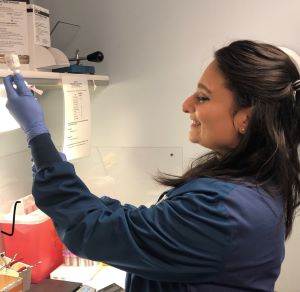When Dr. Karen Golemboski was a kid, she had what she jokingly terms “a morbid interest in sick people” and a great interest in healthcare.
She assumed she would be a nurse. So as soon as she got her driver’s license, she signed on as a candy striper at Sts. Mary and Elizabeth Hospital in southern Louisville. “One afternoon, I realized that while I was very interested in what
was wrong with the patients, I wasn’t the least bit interested in taking care of them,” she said. “They sent me to the lab with a urine sample, and I pretty much never came back.”
Dr. Golemboski went on to earn a bachelor’s degree in Medical Technology (which is now called Medical Laboratory Science) and a Ph.D. in Immunology. Today she is the chair of Bellarmine University’s MLS program, which offers one of only seven
entry-level master’s degrees in the U.S. (including the only one in Kentucky) and is the only university in Louisville to offer both undergraduate and graduate degrees in Medical Laboratory Science.
“It’s a good career for those who are Interested in being on a healthcare team but aren’t interested in hands-on patient care."
“It’s a good career for those who are Interested in being on a healthcare team but aren’t interested in hands-on patient care,” she said. “What we do is science-oriented. We make a difference—about two-thirds of healthcare
decisions are based on our work—but we don’t have face-to-face contact with patients.”
Perhaps because of that, many people don’t really know what medical laboratory scientists do. “They will say, ‘Oh, so you are a nurse?’ or ‘Oh, you’re a phlebotomist?’” Dr. Golemboski said. “No, I’m
this thing that is its own profession.”
It’s a profession that offers 100 percent employment for Bellarmine graduates,
she said, as there is a significant workforce shortage.
Some Bellarmine MLS graduates go into research, but most of them work in hospital labs, testing blood and other body fluids to determine if disease is present. Their work has been highlighted recently as hospitals battle the novel coronavirus (COVID-19).
“When you see videos of the testing centers, those specimens are going back to the lab and it will be a medical laboratory scientist who will do the testing,” Dr. Golemboski said. “In addition, it turns out the disease has had unexpected
effects, like messing up coagulation. Is there a decrease of certain cells? Are there inappropriate clots forming? Is kidney function still going? All of that is medical testing information as well. Medical laboratory scientists are an important part
of the team, because if you don’t have that information, you don’t know how to treat a patient. Nursing doesn’t teach you this, and neither does medical school.”
Bellarmine’s entry-level master’s program does not require an undergraduate degree in MLS. Qualified applicants who have completed prerequisite course work are admitted regardless of their undergraduate field of study.
"This is a great program for those who have an undergraduate degree in biology or chemistry,” Dr. Golemboski said. “In two academic years, you can come and learn the technical content and some additional content, like health
policy and evidence-based patient safety, that helps you to see the broader picture of healthcare so that you are better able to interact with a healthcare team.”
The hope, she said, is that Bellarmine’s master’s graduates can help physicians make better-informed decisions when they order tests. “I used to work in an immunology lab, and some doctors, when they ordered blood tests, they would check
everything on the page. There are still doctors who reflexively do that. Some patients with long stays end up with hospital-induced anemia just from having tests done.
“This is a great program for those who have an undergraduate degree in biology or chemistry.”
“In the 21st century, we need to integrate the team so that we choose the best way to use the test—the best way to get to the result.”
 Meera Patel graduated from Bellarmine in 2015 with a bachelor’s degree in biochemistry
and molecular biology. When her plan to attend medical school was sidelined, she returned to Bellarmine and earned her master’s degree in Medical Laboratory Science in 2019.
Meera Patel graduated from Bellarmine in 2015 with a bachelor’s degree in biochemistry
and molecular biology. When her plan to attend medical school was sidelined, she returned to Bellarmine and earned her master’s degree in Medical Laboratory Science in 2019.
She now works in a specialized Blood Bank Lab at Norton Healthcare, cross-matching blood for patients, confirming their blood types and determining whether they have antibodies that could cause a transfusion reaction. “We do a lot of other specialized
testing with patient blood and donor blood, along with storing platelets, plasma and other blood-derived products,” she said. “We take care of a wide patient population, from newborns to the elderly.”
Patel said she would recommend the undergraduate MLS degree to anyone who is interested in attending medical school, becoming a physician’s assistant, “or really pursuing any higher-level healthcare profession.”
“Physicians and any healthcare providers need to understand laboratory results,” she said. “Laboratory and radiology/imaging services are the two main ways to diagnose a patient with whatever illness or disease they have, because signs
and symptoms don't always tell the whole story.”
Why pursue this degree at Bellarmine?
- 100% graduation rate
- 100% employment; most have job offers before graduation (national median salary: $60,000)
- Certification exam pass rates above the national average
- One of only seven entry-level MLS master’s degree programs in the country
- Annual inter-professional participation in a local community diabetes education program (Active Steps)
- 560 (or more) clinical hours in six laboratory disciplines
- Opportunity for research projects in bioinformatics
Dr. Karen Golemboski, program chair, is a member of the national ASCLS Patient Safety Committee